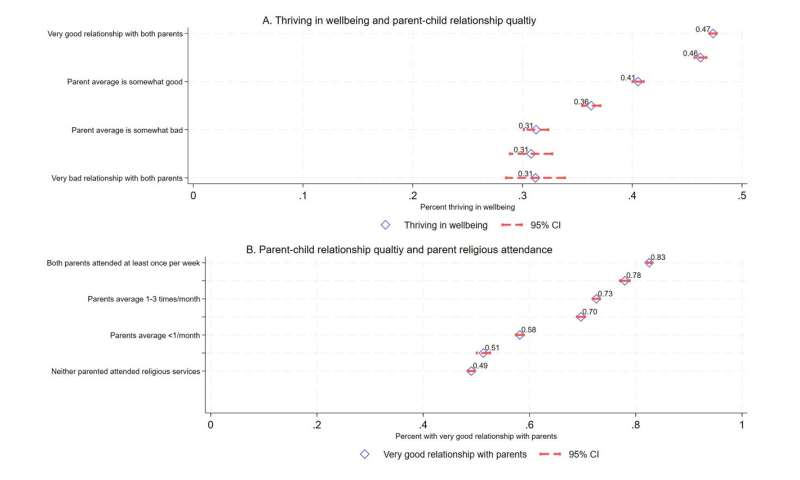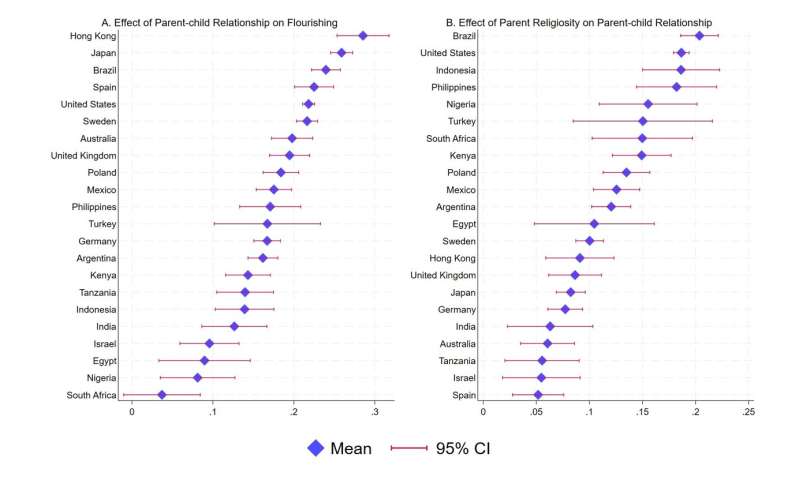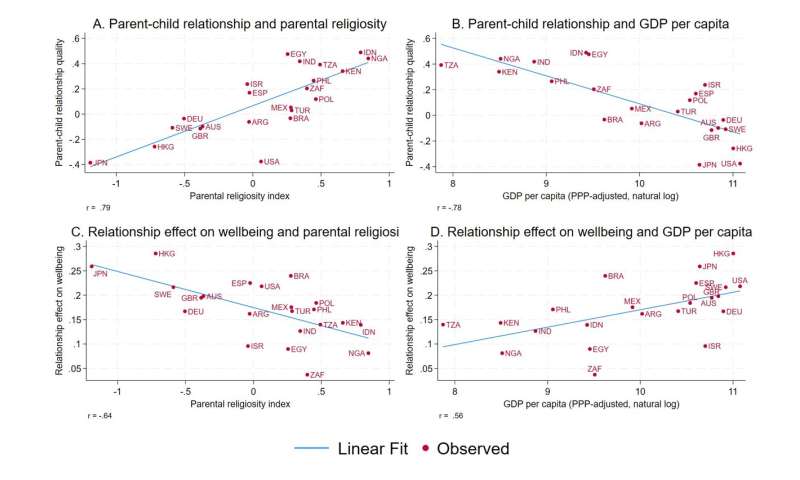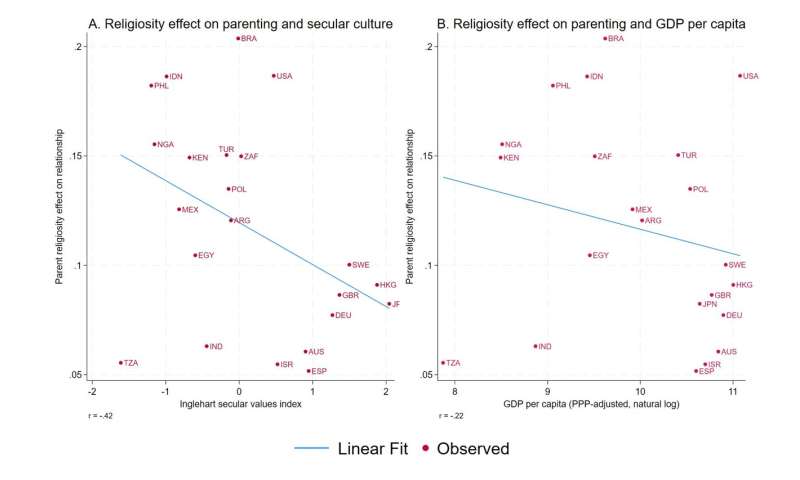Quality of parent-child relationships predicts adulthood well-being, 21-country finds
2024-12-06 11:50:00
The link between early life experiences and mental health has been widely explored by psychology researchers. One key aspect of human early life experiences is the relationship that people develop with their parental figures, which is at the center of attachment theory and various other psychological models.
Past studies suggest that the quality of relationships between parents and their children plays a role in the subjective well-being of these children when they reach adulthood. While this finding is well-documented, many past studies were conducted on relatively small samples of participants residing in a single country.
Jonathan T. Rothwell and Telli Davoodi, two researchers at Gallup, recently carried out a study aimed at exploring the link between parent-child relationships and an adult’s self-reported well-being in a larger and more varied sample that spanned across 21 countries.
Their paper, published in Communications Psychology, suggests that the quality of parent-child relationships predicts the well-being of adults residing in all of the countries they studied.
“I worked in psychiatric treatment facilities and clinics during college and saw many examples of the profound effect that family conflict has on the mental health of adolescents and adults,” Rothwell told Medical Xpress.
“This was in the back of my mind for two decades, as I pursued other work. In recent years, I kept reading about rising adolescent mental health problems in the United States, but it seemed to me that no one was talking about the role of parents either generally or how parenting may have changed over the last several generations.”
Rothwell recently decided to carry out a large survey-based study across the United States exploring the link between parenting practices, the quality of parent-child relationships and youth mental health. This study, which was conducted in collaboration with his co-author Davoodi, collected responses from youths with different racial and ethnic backgrounds.


Credit: Jonathan T. Rothwell and Telli Davoodi. 

Credit: Jonathan T. Rothwell and Telli Davoodi.
The researchers observed very strong links between the three factors they examined, just as developmental and family psychologists have been predicting for decades. While their findings were very insightful, this previous study only collected survey responses from youths in the United States.
“After this previous work, we heard about the Global Flourishing Study, an ambitious partnership between Tyler VanderWeele of Harvard University, Byron Johnson of Baylor University, the Open Science Foundation and Gallup,” said Rothwell.
“The research team wanted to collect deeper, more culturally inclusive data on well-being and human flourishing, and they included several interesting retrospective items on childhood experiences. Telli and I immediately pre-registered a research plan to measure the association between childhood experiences of parenting and adult flourishing and to see what country’s characteristics, if any, mediated the effects.”
In their new study, Rothwell and Davoodi analyzed an even larger pool of data, including 200,000 interviews and surveys gathered over the phone, in-person or online. The participants who were surveyed or interviewed were adults and resided in a total of 21 countries worldwide.
The countries included in this study were selected carefully, to maximize religious and ethnic diversity in the sample. The objective was to include people living in all the broader geographical regions on Earth.
“Adults were asked whether they felt loved by their mother or their father while growing up,” explained Rothwell.
“They were asked whether, in general, the relationship with each parent was very good, somewhat good, somewhat bad, or very bad, and they were asked if they felt like an outsider in their family. These items were used to build an index of parent-child relationship quality”


Credit: Jonathan T. Rothwell and Telli Davoodi. 

Credit: Jonathan T. Rothwell and Telli Davoodi.
To estimate the extent to which study participants were “flourishing” in their adult life, 19 of the questions they were asked specifically touched on their level of hope, satisfaction with their health and virtue. For instance, participants were asked the extent to which they agreed with statements like: : “Despite challenges, I always remain hopeful about the future,” and “If I had to list everything that I am grateful for, it would be a long list.”
“We also measured mental health using seven items, most of which measure clinical symptoms like sadness and anxiety,” said Rothwell. “Importantly, the survey included measures of childhood socio-economic status, parental religiosity, and many items that measure the current respondent’s religious beliefs, economic situation, and family context.”
Rothwell and Davoodi analyzed the participants’ responses all together, with the aim of answering two different research questions. The first was: to what extent do childhood experiences of parenting predict adult well-being? The second was: what predicts better childhood experiences of parenting?
“We found a substantial effect of parent-child relationships on both flourishing and mental health,” said Rothwell. “The effect was larger than any other variable we tested, including parental socio-economic status, current education level, current household income, gender, and financial security.
“The relationship was positive in every country, and it reached conventional levels of significance in all but one. Even that exception seemed to be explained by the relatively young population in the survey. When we re-weighted the data to make the ages similar across countries, we found a significant effect in every country.”
Overall, the findings of this research study suggest that there is a universal link between parent-child relationships and lifelong well-being, which applies to all people, irrespective of where they were raised.
However, the impact of parent-child relationships on well-being appeared to be more pronounced in secular and higher-income countries, perhaps because most people living in these countries do not have to worry about their basic needs being met (i.e., food, shelter, security, etc.). In other words, the well-being of individuals in developing or low-income countries could also be adversely affected by other factors, including poverty, war and starvation.
“Our main secondary finding is that more religious parents tend to have better relationships with their children in every country in our sample,” said Rothwell.
“Perhaps partly as a result, higher income and secular countries score lower on our flourishing index than lower-income and more religious countries. For me, the implication presents a formidable cultural challenge: as the world develops and becomes more secular, we need to be careful not to discard traditional wisdom related to child-rearing.”
The recent work by Rothwell and Davoodi suggests that all people’s experience with their parents influences their well-being and mental health during adulthood. In the future, this key finding could pave the way for more large-scale global studies designed to further explore this widespread effect.
“In early 2025, my colleagues and I at Gallup are fielding a new U.S. survey on parenting to further improve the measurement of parenting practices that lead to the highest quality relationships and best long-term health/” rel=”tag” class=”textTag”>mental health outcomes,” added Rothwell.
“I also want to understand how parenting affects the development of character traits and virtues, and further tease out contributions of genetics from those of parenting practices. In addition to generating more academic publications, I plan to write all this up and more in a book that I hope to finish next year.”
More information:
Jonathan T. Rothwell et al, Parent-child relationship quality predicts higher subjective well-being in adulthood across a diverse group of countries, Communications Psychology (2024). DOI: 10.1038/s44271-024-00161-x.
© 2024 Science X Network
Citation:
Quality of parent-child relationships predicts adulthood well-being, 21-country finds (2024, December 6)
retrieved 6 December 2024
from https://medicalxpress.com/news/2024-12-quality-parent-child-relationships-adulthood.html
This document is subject to copyright. Apart from any fair dealing for the purpose of private study or research, no
part may be reproduced without the written permission. The content is provided for information purposes only.
Source link
medicalxpress.com
#Quality #parentchild #relationships #predicts #adulthood #wellbeing #21country #finds





